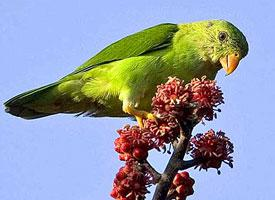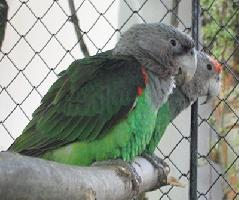
Váhy a míry
| Délka | 14 cm |
|---|
Popis zvířete
The Vernal Hanging Parrot, scientifically named Loriculus vernalis, is a captivating small bird species belonging to the parrot family. This diminutive bird, often measuring around 14 cm in length and weighing between 28 to 34 grams, is known for its vibrant plumage and unique behaviors. Its natural habitats span across a broad range from the Indian subcontinent to Southeast Asia, including countries like India, Sri Lanka, Bangladesh, Nepal, Bhutan, and parts of Myanmar, Thailand, Laos, Vietnam, and Cambodia.One of the most striking features of the Vernal Hanging Parrot is its colorful plumage. The males of the species typically showcase a bright green body that allows them to blend seamlessly into the leafy canopies of forests. They have a distinctive red patch on their throat and rump, which adds to their visual appeal. The females, while also primarily green, have a less pronounced red throat patch, making them slightly less vivid than their male counterparts. Both sexes have a short, curved beak that is perfectly adapted to their diet of fruits, buds, seeds, and nectar.
The Vernal Hanging Parrot is unique among parrots for its ability to sleep upside down, similar to bats. This peculiar behavior has fascinated bird watchers and scientists alike, contributing to the bird's name. They are also known for their swift and direct flight, which they employ to move between feeding and nesting sites within their forested habitats.
Speaking of habitats, the Vernal Hanging Parrot prefers dense forests, particularly those with a rich undergrowth and scattered clearings where it can forage. They are also found in wooded gardens and plantations, demonstrating a degree of adaptability to modified landscapes. Despite this adaptability, habitat loss and degradation pose significant threats to their populations in certain areas.
Breeding season for the Vernal Hanging Parrot varies depending on the region but generally falls between February and September. During this time, pairs become more territorial and engage in the construction of their nests. They prefer to nest in hollows of dead trees, where the female lays 2 to 4 white eggs. The incubation period lasts about 20 days, with chicks being born altricial (blind and featherless). Both parents participate in feeding and caring for the chicks until they are ready to fledge.
In terms of vocalization, the Vernal Hanging Parrot is relatively quiet compared to other parrot species. Their calls are described as soft and tinkling, often heard while they are flying or foraging within the forest canopy.
Despite facing threats from habitat loss and in some regions, trapping for the pet trade, the Vernal Hanging Parrot is currently listed as Least Concern by the International Union for Conservation of Nature (IUCN). This status indicates that, at present, the species is not considered at immediate risk of widespread decline. However, continuous monitoring and conservation efforts are essential to ensure that these enchanting birds continue to thrive in their natural habitats.
Podobná zvířata
Nové fotografie zvířat
Top 10 zvířat
- Dolphin gull (Leucophaeus scoresbii)
- Diana monkey (Cercopithecus diana)
- Moustached guenon (Cercopithecus cephus)
- Galápagos tortoise (Geochelone nigra complex)
- Stone loach (Barbatula barbatula)
- Japanese macaque (Macaca fuscata)
- Greek tortoise (Testudo graeca)
- Russian tortoise (Testudo horsfieldii)
- Common flying dragon (Draco volans)
- Galápagos penguin (Spheniscus mendiculus)


